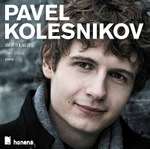|
Back
04/08/2013
Ludwig van Beethoven: Sonata No. 14 in C-sharp minor Op. 27 No.2 ("Moonlight")
Robert Schumann: Kinderszenen Op. 15
Frederic Chopin: Sonata No. 3 in B-minor, Op. 58
P. I. Tchaikovsky: Piano Concerto No. 1 in B-flat minor, Op. 23
Felix Mendelssohn: Sonata for cello and piano No. 2 in D major, Op. 58
Pavel Kolesnikov (piano), Johannes Moser (cello), The Calgary Philharmonic Orchestra, Roberto Minczuk (conductor)
Recorded at Jack Singer Concert Hall, Calgary (October 2012) – 125’
Honens 201203CD/201204CD

   
Pavel Kolesnikov, a 23-year-old Russian, was the first laureate of the seventh Honens International Piano Competition held in Calgary in October, 2012. Honens has released studio CDs by previous laureates but this time they have released a double CD set of the laureate’s winning performances.
The Honens Competition, held every three years, puts its entrants through a challenging process as they seek someone who is a “complete artist”. Fifty applicants (age 20 to 30) are chosen to perform a recital (in Berlin, London, New York or Los Angeles) which is video-recorded, as is an interview. A first jury (with four members) then views the videos and selects 10 semi-finalists who will attend the final rounds in Calgary which will be judged by a seven-member second jury. Each pianist must then perform a 60-minute solo recital (not repeating anything from their first recital) and, after rehearsals, a 70-minute collaborative recital with a violinist, cellist and singer. Competitors are to include at least one “pivotal” work in their recitals. Five of the 10 are selected for the concerto round, and for them there is yet another taped interview.
The competition employs two Official Mathematicians who have devised what is called the “Optimal Jury Scoring System”. There are 18 detailed scoring rules (available for download at www.honens.com).
The 2012 results: It’s easy to understand why Pavel Kolesnikov impressed the jurors. He has all the technical ability we have come to expect from aspiring pianists (a trait that seems to be disparaged as widely as it is insisted upon). Four of the five works on the disks are most definitely “pivotal”, the exception being the Mendelssohn Sonata for cello and piano No. 2, composed in 1843 during the composer’s Leipzig years. I would recommend hearing it first so it doesn’t seem like an encore to the barn-burning Tchaikovsky concerto. The last two movements are a special delight, what with the Bachian arpeggios in the Adagio movement, quickly moving into the giddiness of the Molto allegro e vivace of the final movement. The performance is especially impressive considering the pianist and cellist had only one rehearsal limited to 40 minutes. Cellist Johannes Moser impresses as well with warm tone and springy rhythms.
The opening work on disc one, the “Moonlight” Sonata, might give some people pause because of the slow pace of the opening movement where Kolesnikov takes almost six and a half minutes. It will be called self-indulgent by many, but it is marked Adagio sostenuto and he does manage (for me) to sustain it.
Schumann’s Kinderszenen has 13 contrasting sections. I don’t feel he has quite the measure of the concluding section Der Dichter spricht (“The poet speaks”) in which Schumann composed a halting, tongue-tied set of phrases that are hard to make eloquent. He succeeds wonderfully, though, in the Fürchtenmachen (“Scary”) section, one of Schumann’s scrambly pieces; he also does well with the much-loved Träumerei.
The Chopin Sonata No. 3 comes across as a very well-expressed statement of perhaps the composer’s most brilliantly sustained longer work.
As for the Tchaikovsky concerto it is THE pianistic warhorse and thus a challenge to listen to with fresh ears. The Calgary Philharmonic Orchestra under its music Director Roberto Minczuk are firmly with the soloist throughout (it’s not one of those performances where they are together just at the start and finish). There’s both bravura and lyricism - and the finale is as exciting as it ought to be.
The recordings are well-produced with good balances and realistic sound. There is amazingly little audience noise aside from the applause. It adds up to a terrific calling card for a young man setting out on what could well be a major career. As Honens first laureate he wins $100,000 plus a three-year career development program valued at $500,000. Thirty-nine musical presenting organizations (in Canada, the US, the UK, Germany, and Singapore) are in line to engage him. There will also be a recording coming out on the Hyperion label (Michael Spring of Hyperion was a jury member). Watch for Pavel Kolesnikov at a concert hall near you.
Michael Johnson
|